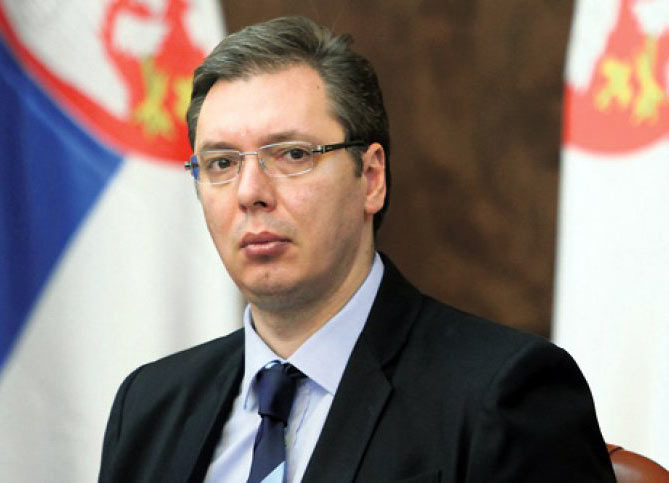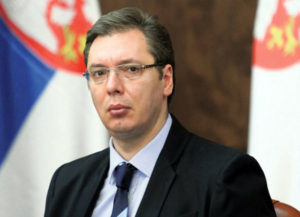



In April 2017, Vučić was elected President of Serbia with 55%, thus avoiding second round of the vote. He will assume office on 31 May 2017, succeeding Tomislav Nikolić.
Aleksandar Vučić was born in Belgrade, the son of Angelina (née Milovanov) and Anđelko Vučić. His paternal family hails from Čipuljić near Bugojno in central Bosnia, from whence they were expelled by the Croatian fascist Ustaše, settling near Belgrade where his father Anđelko was born. Vučić’s paternal grandfather Anđelko, and tens of other close relatives were killed by the Ustaše. His mother was born in Bečej in Vojvodina. Both of his parents were economics graduates. His father worked as an economist, his mother as a journalist.
Vučić was brought up in New Belgrade, and finished the Branko Radičević elementary school, and later a gymnasium in Zemun. He graduated from the Faculty of Law, University of Belgrade. He learned English in Brighton, England, and worked as a merchant in London for some time. After returning to Yugoslavia, he worked as a journalist in Pale, Bosnia and Herzegovina. There, he interviewed politician Radovan Karadžić and once played chess with general Ratko Mladić. As a youngster, Vučić was a fan of the Red Star football club, often attending Red Star’s matches, including the one played between Dinamo Zagreb and Red Star on 13 May 1990, which turned into a huge riot. The homes of his relatives were destroyed in the Croatian War of Independence.
On 27 July 1997 Vučić married Ksenija Janković, a journalist at Radio Index and Srpska reč. The couple has two children. The marriage ended with divorce in 2011. On 14 December 2013, Vučić married Tamara Đukanović, a diplomat at the Serbian Ministry of Foreign Affairs.
Source: https://en.wikipedia.org/wiki/Aleksandar_Vu%C4%8Di%C4%87
Boris Tadic was elected president of Serbia on June 27, 2004. A reformist politician from the Democratic party, Tadic defeated Tomislav Nikolic, a nationalist ally of Slobodan Milosevic, in a presidential run-off that was held after Nikolic fell short of a clear victory in the first round of voting.
A professor of psychology, Tadic entered politics in 1990, when he joined Democratic party. Tadic served as Yugoslavia’s minister of communications and as the defense minister of the union of Serbia and Montenegro. He became the leader of the Democratic party after the assassination of President Zoran Djindjic, the first non-communist prime minister of Serbia since World War II.
Tadic’s pro-Western Democrats led the uprising against Milosevic in 2000, but difficult economic reforms led to a resurgence of nationalism in the years since, and in December of 2003, the Democrats lost their control of parliament and control of the government was handed over to moderate nationalists and conservatives.
Tadic has pledged to revive Serbia’s economy, to move Serbia closer to the European Union and NATO, and to help find a peaceful solution for Kosovo. In his victory speech, he also vowed to ensure that Serbia would “meet its international obligations”, which was understood as a reference to cooperation with the United Nations War Crimes Tribunal at the Hague which is investigating the Balkan wars of the 1990s and is trying Milosevic for crimes that were allegedly committed during his rule. This cooperation is seen as crucial to ensure Western financial support of Serbia.
Rishi Sunak, Prime Minister of the United Kingdom (since Oct 25, 2022) Rishi Sunak (born…
Giorgia Meloni, Prime Minister of Italy (since Oct 22, 2022) Giorgia Meloni (born 15 January…
Mahamat Déby, President of Chad (since Oct 10, 2022) Mahamat Idriss Déby Itno (born 1…
João Lourenço, President of Angola (sworn in on Sept 26, 2017) Sworn in for his…
William Ruto, President of Kenya (elected on Aug 9, 2022 with 50.5% of the vote)…
Gustavo Petro, President of Colombia (since Aug 7, 2022) Gustavo Francisco Petro Urrego ODB ODSC…
This website uses cookies.